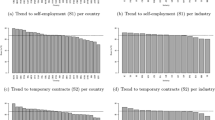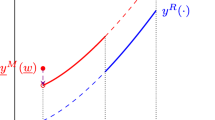Abstract
This paper studies a multi-stage decentralized matching model where firms sequentially propose their (unique) positions to workers. At each stage workers sequentially decide which offer to accept (if any). A firm whose offer has been declined may make an offer to another worker in the next stage. The game stops when all firms either have been matched to a worker or have already made unsuccessful offers to any worker remaining in the market. We show that there is a unique subgame-perfect equilibrium outcome, the worker-optimal matching. Firms in this game have a weakly dominant strategy, which consists of making offers in the same order as given by their preferences. When workers play simultaneously any stable matching can be obtained as an equilibrium outcome, but an unstable matching can obtain in equilibrium.
Similar content being viewed by others
References
Alcalde J (1996) Implementation of stable solutions to marriage problems. J Econ Theory 69: 240–254
Alcalde J, Romero-Medina A (2000) Simple mechanisms to implement the core of college admission problems. Games Econ Behav 31: 294–302
Alcalde J, Pérez-Castrillo D, Romero-Medina A (1998) Hiring procedures to implement stable allocations. J Econ Theory 82: 469–480
Blum Y, Roth AE, Rothblum UG (1997) Vacancy chains and equilibration in senior-level labor markets. J Econ Theory 76: 362–411
Diamantoudi E, Miyagawa E, Xue L (2006) Decentralized matching: the role of commitment. Mimeo
Ergin HI (2002) Efficient resource allocation on the basis of priorities. Econometrica 70: 2489–2497
Gale D, Shapley L (1962) College admission and the stability of marriage. Am Math Mon 69: 9–15
Gale D, Sotomayor M (1985) Some remarks on the stable matching problem. Discrete Appl Math 11: 223–232
Kelso A, Crawford V (1982) Job matching, coalition formation, and gross substitutes. Econometrica 50: 1483–1504
Knuth DE (1976) Mariages stables et leurs relations avec d’autres problèmes combinatoires. Les Presses de l’Université de Montréal, Montreal, Québec. Introduction à l’analyse mathématique des algorithmes, Collection de la Chaire Aisenstadt
Martínez R, Massó J, Neme A, Oviedo J (2000) Single agents and the set of many-to-one stable matchings. J Econ Theory 91: 91–105
McVitie D, Wilson LB (1970) Stable marriage assignment for unequal sets. BIT 10: 295–309
Niederle M, Yariv L (2009) Decentralized matching with aligned preferences. Mimeo
Osborne MJ, Rubinstein A (1994) A course in game theory. MIT Press, Cambridge
Pais J (2008) Incentives in decentralized random matching markets. Games Econ Behav 64: 632–649
Peleg B (1997) Implementation of the core of a marriage problem. Discussion paper ♯32. Hebrew University of Jerusalem
Roth AE (1982) The economics of matching: stability and incentives. Math Oper Res 7: 617–628
Roth AE (1985) The college admissions problem is not equivalent to the marriage problem. J Econ Theory 36: 277–288
Roth AE, Sotomayor M (1990) Two-sided matching: a study in game-theoretic modeling and analysis. Econometric Society Monographs, No. 18. Cambridge University Press, Cambridge
Roth AE, Xing X (1997) Turnaround time and bottlenecks in market clearing: decentralized matching in the market for clinical psychologists. J Polit Econ 105: 284–329
Suh S-C, Wen Q (2008) Subgame perfect implementation of stable matchings in marriage problems. Soc Choice and Welfare 31: 163–174
Author information
Authors and Affiliations
Corresponding author
Rights and permissions
About this article
Cite this article
Haeringer, G., Wooders, M. Decentralized job matching. Int J Game Theory 40, 1–28 (2011). https://doi.org/10.1007/s00182-009-0218-x
Accepted:
Published:
Issue Date:
DOI: https://doi.org/10.1007/s00182-009-0218-x




